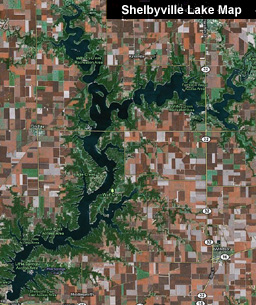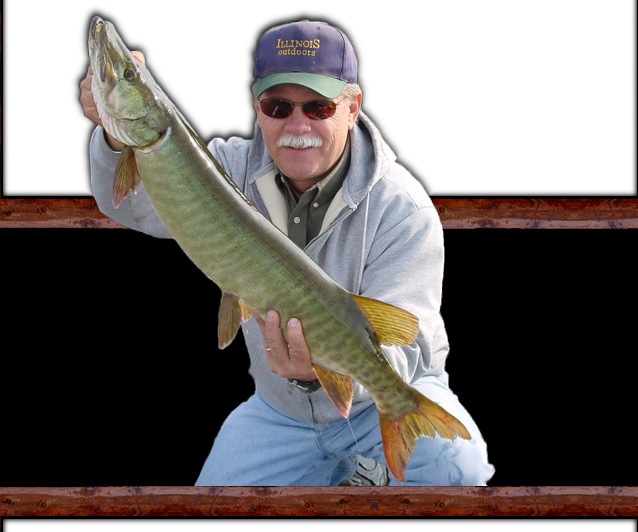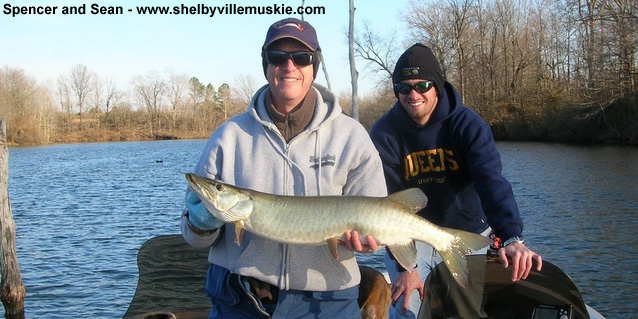|



|  |

|  |

| |
|
Lake Shelbyville Muskie Fishing
Lake Shelbyville's Muskie fishing gets better and better every year. They have tons of food, great spawning grounds, lots of cover and many miles to roam. If you read the report below it describes Muskie tournaments taking place with the same people who are always successful while others get skunked. The lack of Muskie being caught is a result of technique and not population and availability.
Many people go bass fishing for Muskie. They hit the shoreline and weedbeds and cast spinner baits and jerk baits. There is so much food in Lake Shelbyville that the Muskie do not need to be right close to shore or in thick weeds to hunt down their food. Muskie, when well fed, are naturally an open water fish and will spend more time on the outside of the weeds facing the open areas of the main lake. You can even say Muskie are claustrophobic and the larger fish tend to stay at the points leading into bays instead of going right into the bay.
|

|
Another reason why beginners to Muskie fishing do not do well is because of folklore. Traditional Muskie fishing involved trolling really fast with gigantic lures. In actual fact, you will catch more Muskie trolling slower in the 4 to 6 mph range and using smaller lures. Rapala J-11 are a top producing lure for Muskie trolling. If you like casting, cast the same spinnerbaits you would use for large bass. Try to stay off weedbeds and points that face the open lake. In the spring and summer the Muskie tend to hit bright colors such as Fire Tiger, Red & Chartreuse. In late summer and fall, Muskie tend to hit colors that represent their natural food. Silver & black, which mimics Silver Bass, gold & black, which mimics Walleye are best the best fall colors. Perch color also works well. Muskie also like stable weather. It does not matter if it's sunny and calm or windy and raining, as long as there is no dramatic change in weather, the Muskie should be hitting. Drastic changes in weather can cause them to slow down or even stop feeding for days.
Muskie Fishing Tips & Tactics:
The following three Muskie fishing articles were written by Dr. Gene Smith from Kentucky. They are a good read if you want to target Muskie in Lake Shelbyville.
Location for Transition Muskies in Southern Reservoirs (off site)
Crankbait Options for Muskies in Heavy Cover (off site)
Early Fall Southern Muskie Tactics (off site)
Lake Shelbyville Muskie Fishing Report
Muskellunge - fair to good - Pure muskellunge were first stocked in Lake Shelbyville in 1978. It wasn't until 1988, however, that somewhat consistent year-to-year stockings of 5,500 fingerlings per year were initiated. Compared to the known potential longevity of this species, this fishery is still relatively young compared to the many well known fisheries in northern United States and Canada.
In recent years this lake has produced an outstanding Muskie fishery, however catch rates in 2007, 2008, 2009, and 2010 have been depressed for unknown reasons. Floods may have been partially to blame in >08 and >09, allowing Muskies to use heavy brush for cover which makes fishing for them more difficult, however water levels were close to normal in fall 2010. Fishing for Muskie was very poor during the spring and summer, both on the lake and below the spillway in 2007 and 2008, but improved slightly in 2009 and 2010. Fishing improved the most below the spillway.
|



|
Two major Muskie tournaments held on Lake Shelbyville in fall 2010. The catch as reported was distributed as 3 fish (LSMC, 14 boats, biggest 36") and 10 fish (IMTT Fall Classic, 25 boats, biggest 44"). One team caught all three fish in the first tournament reported. Although catch rates in general have been depressed, in most of the recent tournaments, one team, or one fisherman, has figured out a pattern to catch several fish and easily win the tournament.
Without extensive sampling it is difficult to assess Muskie numbers on Lake Shelbyville. No Muskies were collected in the 2010 fall fish population survey by the IDNR crew. Illinois Natural History Survey employees collected several Muskie in subsequent surveys while collecting fish for a diet study of Muskie. Although collection rates were poor, Muskie numbers likely remain fair to good on the lake and improved in the area below the dam. Fishing prospects for 2011 are expected to be fair to good for numbers and fair for size on the lake and fair to good for both numbers and size below the lake in the spillway area.
Lake Shelbyville Fishing Tournaments
Lake Shelbyville Big Fish Program
Fishing Report Compliments of Lake Shelbyville Guide Service (off site)
1st Picture Compliments of Illinois Outdoors (off site)
|
|